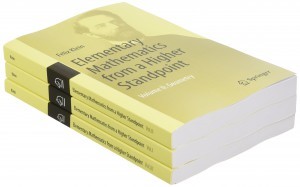Books and Articles
Books and Articles related to Felix Klein (and the Klein Project)
See the Klein Project Blog.
Algebraic Analysis in Klein‘s „Elementary Mathematics from a Higher Standpoint”
This paper by Hans Niels Jahnke, University of Essen, Germany, will clarify the genesis and meaning of the concept of algebraic analysis as it is used in Felix Klein’s Elementary Mathematics From an Advanced Standpoint (original German publication in 1908, English translation in 1932). The concept has a somewhat intricate history, and modern readers are no longer familiar with its meaning at Klein’s times. We shall see that, surprisingly, it is a key concept for understanding the part on analysis in Klein’s book.*
* The present paper is an abbreviated version of Jahnke, H. N. (2018). Die Algebraische Analysis in Felix Kleins „Elementarmathematik vom höheren Standpunkte aus“. Mathematische Semesterberichte, 65(2), 211-251. doi:10.1007/s00591-017-0210-7
The Legacy of Felix Klein

The Legacy of Felix Klein by Hans-Georg Weigand, William McCallum, Marta Menghini, Michael Neubrand and Gert Schubring (Eds.) (2019).
Throughout his professional life, Felix Klein emphasised the importance of reflecting upon mathematics teaching and learning from both a mathematical and a psychological or educational point of view, and he strongly promoted the modernisation of mathematics in the classroom. Felix Klein developed ideas on university lectures for student teachers, which he later consolidated at the beginning of the last century in the three books Elementary Mathematics from a higher standpoint. At the 13th International Congress on Mathematical Education (ICME-13) 2016 in Hamburg, the “Thematic Afternoon” with the The Legacy of Felix Klein as one major theme, provided an overview of Felix Klein’s ideas. It highlighted some developments in university teaching and school mathematics related to Felix Klein’s thoughts stemming from the last century. Moreover, it discussed the meaning, the importance and the legacy of Klein’s ideas nowadays and in the future in an international, global context.
The whole book intends to show that many ideas of Felix Klein can be reinterpreted in the context of the current situation, and give some hints and advice for dealing today with current problems in teacher education and teaching mathematics in secondary schools. In this spirit, old ideas stay young, but it needs competent, committed and assertive people to bring these ideas to life.
(–> Link to Springer)
Elementary Mathematics from a Higher Standpoint

Three Volumes of Felix Klein’s “Elementary Mathematics from a Higher Standpoint”
The volumes, first published between 1902 and 1908, are lecture notes of courses that Klein offered to future mathematics teachers, realizing a new form of teacher training that remained valid and effective until today: Klein leads the students to gain a more comprehensive and methodological point of view on school mathematics. The volumes enable us to understand Klein’s far-reaching conception of elementarisation, of the “elementary from a higher standpoint”, in its implementation for school mathematics.
These three volumes constitute the first complete English translation of Felix Klein’s seminal series “Elementarmathematik vom höheren Standpunkte aus”. “Complete” has a twofold meaning here: First, there now exists a translation of volume III into English, while until today the only translation had been into Chinese. Second, the English versions of volume I and II had omitted several, even extended parts of the original, while we now present a complete revised translation into modern English. These translations were done bei Marta Menghini (University of Rome) und Gert Schubring (University of Bielefeld and University of Rio de Janeiro).
(–> Link to Springer)
Prizes in mathematics, 2020
by Nitsa Movshovitz-Hadar (Technion - Israel Institute of Technology)
Did you know? - Over 125,000 new items are added each year, to the international database managed by the American Mathematical Society called MathSciNet®. A vast majority of these items contain new results, continuously enriching the ever-growing discipline known as Mathematics. To celebrate these tremendous achievements, all to be credited to the incredible creativity of mathematicians, several valuable awards have been established. This vignette is about a few of the more prestigious ones. It opens with the two that nowadays are often described as the Nobel Prize in mathematics: the Fields Medal and the Abel Prize.